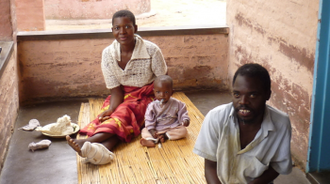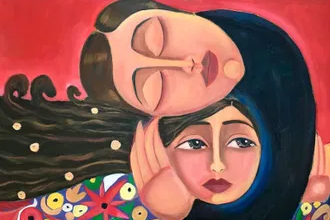World Leprosy Day

Mutemwa, Zimbabwe - image ICN/JS
Cardinal Peter Turkson, Prefect of the Dicastery for the Promotion of Integral Human Development, issued a special statement for World Leprosy Day, which takes place on the last Sunday of January.
"Fear of this disease, which is one of the most feared in human history, defeats reason; lack of knowledge by a community about this pathology excludes those who have been cured of it, who, in their turn, because of the suffering and the forms of discrimination that they have endured, have lost the sense of dignity that belongs to them and is inalienable even though their bodies have mutilations;"
Cardinal Turkson writes: "For them, and above all with people who are victims of leprosy, we must engage ourselves more deeply so that they can find welcome, solidarity and justice."
The full Message by Cardinal Turkson is below:
The eradication of leprosy and the reintegration of people afflicted by hanseniasis:
a challenge not yet won.
The development of effective pharmacological therapies and the major efforts at a planetary level of many national and international institutions and agencies, with the Catholic Church in the front line, over the last decades have inflicted a very severe blow on Hansen's disease, known more commonly as leprosy. Hanseniasis, which in the year 1985 still afflicted over five million people in the world, today has about 200,000 new cases each year, but much - very much - still has to be done.
As for that matter was highlighted last June at the end of the symposium 'Towards Holistic Care for People with Hansen's Disease Respectful of their Dignity', which was organised by the then Pontifical Council for Health Care Workers, every new case of Hansen's disease is one case too many, as is every residual form of stigma attached to it. Every law that discriminates against patients with Hansen's disease is one law too many, as is every form of indifference.
Within the framework of the initiative promoted in cooperation with the Nippon Foundation-Sasakawa Health Foundation, with the contribution of the Order of Malta, the Raoul Follereau Foundation and the Good Samaritan Foundation, it was further emphasised that given their role, it is important for the leaders of all religions, in their teachings, writings and speeches, to contribute to the elimination of discrimination against people afflicted by Hansen's disease. On the other hand, as was also emphasised subsequently by the World Health Organisation during the World Forum on hanseniasis held in Seoul in November, physical and psychological care should be assured to patients during and after the end of their treatment.
In addition, we should all commit ourselves - and at all levels - to ensuring that in all countries policies relating to the family, to work, to schools, to sport, and policies of every other kind, that directly or indirectly discriminate against these people are changed, and that governments develop implementing plans that involve people with this disease.
Lastly, strengthening scientific research in order to develop new medical products, and obtain better diagnostic instruments in order to increase the possibility of early diagnosis, is fundamental.
Indeed, in large part new cases are identified only when the infection has provoked permanent lesions and has marked, by now for life, the adults or boys or girls who have this disease. On the other hand, especially in the most remote areas, it is difficult to assure the assistance that is needed to finish the treatment or it is difficult for the patients themselves to understand the importance of - or anyway give priority to - continuing with the pharmacological treatment where this has been begun.
But treatment is not enough. A person who has been cured of this disease must be reintegrated to the full into his or her original social fabric: his or her family, community, school, or work environment.
In order to promote and contribute to this process of reintegration, which for that matter remains almost impossible in many contexts, associations of former patients should be further supported and encouraged. At the same time, the spread of communities, with these former patients, should be promoted which - as has already taken place, for example, in India, in Brazil and in Ghana - become real families who understand and welcome people, offering a fertile terrain for mutual aid and authentic brotherhood.
With reflection, as well, upon the healing of the man with leprosy by Jesus narrated in the first chapter of the Gospel According to Mark. Christ 'Moved with pity...stretched out his hand, touched him, and said to him, "I will do it. Be made clean." The leprosy left him immediately, and he was made clean'. Then he 'said to him, "See that you tell no one anything but go, show yourself to the priest and offer for your cleansing what Moses prescribed; that will be proof for them"'.
Thus it was that Jesus not only healed the person in his entirety but also called on the man whom he healed to go to he who could declare his full reintegration into society, his readmission into the 'human consortium'.
Perhaps today as yesterday this is a greatest obstacle to be overcome for those who have been marked by hansensiasis and for those who work for them. The disabilities, the unmistakeable signs left behind by this disease, are still today similar to brands. Fear of this disease, which is one of the most feared in human history, defeats reason; lack of knowledge by a community about this pathology excludes those who have been cured of it, who, in their turn, because of the suffering and the forms of discrimination that they have endured, have lost the sense of dignity that belongs to them and is inalienable even though their bodies have mutilations. 'For' them, and above all 'with' people who are victims of leprosy, we must engage ourselves more deeply so that they can find welcome, solidarity and justice.
After the Angelus on Sunday, Pope Francis also mentioned World Leprosy Day with an appeal to beat the disease but also to fight the discrimination it generates. He pointed out that although leprosy is in decline, it is still much feared and it invariably strikes the poorest and the most marginalized persons.
"I send my encouragement to those who work to assist the victims of leprosy and assure them of my prayers" he said.
Source: Vatican Radio
Read about the Leprosy Mission here: www.leprosymission.org.uk/
The Mutemwa centre in Zimbabwe cares for leprosy patients from many parts of Africa: www.zimbabwechallenge.org/mutemwa-leprosy-and-care-centre/















